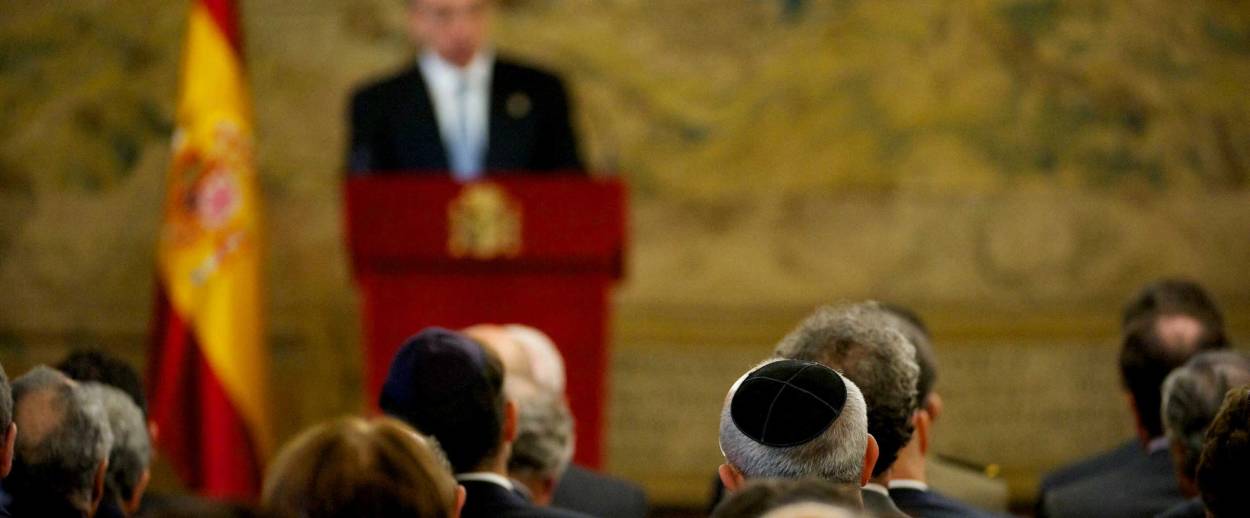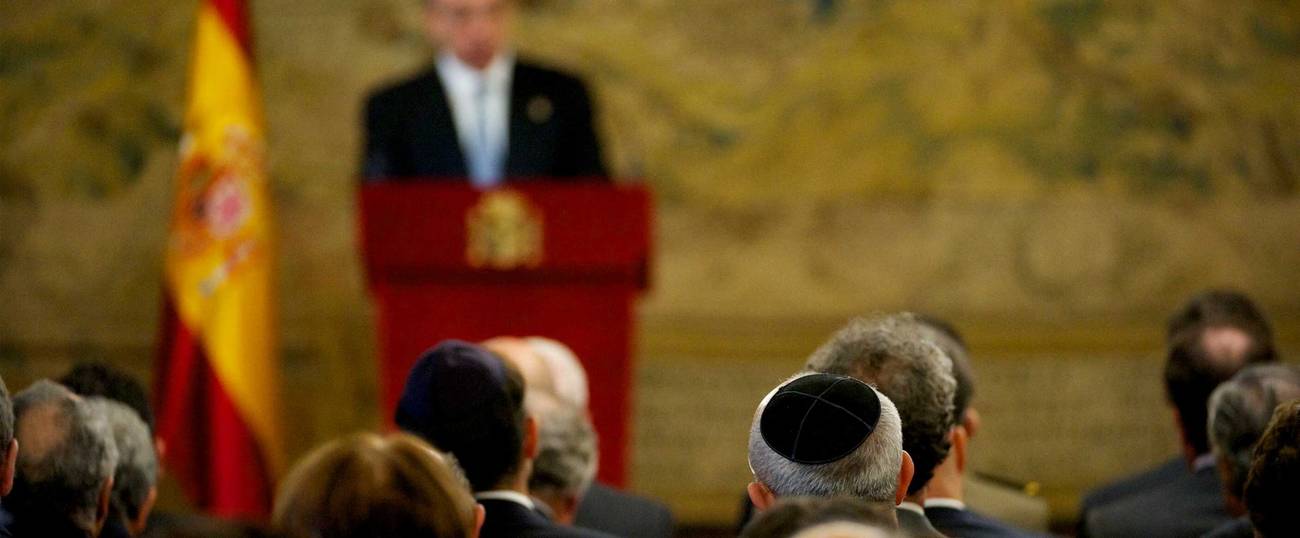The Lost Tribes of Spanish Jews
Torn between leaving or staying in chaos, Venezuelan Jews turn toward Spain




Being a Jew in Spain, especially in the southern part of the country that was once home to a thriving community, is a lonely business. That didn’t stop more than 10,000 Venezuelans from trying to obtain Spanish citizenship before a law giving Jews the right to return to Spain expired at the end of this past September—a testament to how dire the crisis had become in the South American country.
Since 2016, violence, poverty, and insecurity have plagued Venezuela, where political upheavals have led to economic and humanitarian crises. Some 4.3 million Venezuelans have fled the country, according to the United Nations’ refugee agency. Many have emigrated to neighboring South American countries, such as Ecuador or Colombia. But in an unexpected historical turn, Venezuelan Jews have tried to capitalize on their fleeting chance at returning to Spain, a country most have never known.
Some 500 years after the expulsion of Spanish Jews, the legal path had opened to reclaim citizenship—in an effort to right prior wrongs, and possibly restart Jewish communities in the Iberian Peninsula. Between establishing the law allowing Jews to petition for citizenship in October 2015 and its expiration last month, the Spanish government reported over 130,000 requests for were filed. “By 31 August, 60,226 applications had been received, but in September alone, almost 72,000 were received, most of them from citizens in Latin American countries, mainly Mexico, Colombia and Venezuela,” the Spanish Justice Ministry said in a statement.
However, a recently published report in the Spanish newspaper La Razon that was picked up by the Times of Israel, calls into question the background of more than a quarter of all applications filed before the law expired. “Nearly 43,000 applicants, or 27 percent of the total who applied before the closing of the deadline for applications in October, are not Jewish according to the relatively liberal definition of who is a Jew applied by the World Jewish Congress,” according to the Times of Israel.
***
Spanish Jews were forced into exile in 1492, the same year that Catholic forces defeated the last of the Muslim armies that had invaded the Iberian Peninsula in the eighth century. While Jews were confined to second-class citizenship during the period of Muslim rule in Spain, those years also coincided with a flourishing of Spanish Jewish civilization that came to a tragic end in 1492 when the Catholic monarchy led by Queen Isabella and King Ferdinand issued the infamous Edict of Expulsion, a decree forcing Jews to either convert, leave or be killed. Even among the supposed converts who stayed in Spain, many, known as conversos, tried to hold onto their faith and eventually fled to openly practice Judaism in Latin America, Africa and other parts of Europe. Today, Spain has one of the smallest Jewish communities in Europe—an estimated 45,000 Jews currently live in the country, the majority in Madrid and Barcelona, according to the European Jewish Congress.
Given the high number of expected applicants applying for citizenship, agencies cropped up both in Spain and elsewhere, to help applicants navigate the mountain of paperwork required in the notoriously complex verification process. In order to be approved, according to Spain’s Ministry of Foreigners, entrants must show proof of their Sephardic heritage and provide a special connection to Spain. They have to take a cultural test showing their knowledge of the country’s culture, often at the headquarters of Cervantes Institute, specialized centers run by the government.
Despite the difficult process, the escalating crisis in Venezuela led to a surge in applicants, says Jose Leon Delgado, the operations director for a Spanish legal organization, Kamino de Miel y Leche—in English, the road to milk and honey—that assists Jews applying for citizenship. Delgado alone has processed over 3,000 applications, the majority from Venezuela, but won’t say how many have been successful due to Spanish privacy laws. Spain’s Federation of Jewish Communities (FCJE), which certifies applications, told the Guardian, it had received more than 30,000 from Mexico, 26,000 from Colombia, 14,000 from Venezuela, 7,000 from Argentina, 5,400 from the U.S. and 4,900 from Israel.
***
For now, Venezuela still has the remnants of a functioning Jewish community. Approximately 10,000 Jews remain in the country attending some 20 functioning synagogues, says Edgar Benaim, president of the Israeli Association of Venezuela, who says the government currently provides permits to the Jewish community to import wine and kosher goods.
For Venezuela’s Jews, leaving their vibrant community is a complicated decision, and particularly for older members of the community who have concerns about the process of cultural assimilation, the challenge of learning a new language and limited opportunities.
“We are going through such a difficult political and economic situation that has forced us to emigrate to Spain,” says Moises Botbol, 63, who received his residency but still hasn’t left Venezuela. “It is not easy to start again in a foreign country and Venezuela has always been so good to Jews.”
While Benaim and Botbol still feel connected to Venezuela’s Jewish community—many Jews started fleeing the country after Hugo Chavez took power and severed diplomatic relations with Israel.
Those Venezuelans who are able to return to Spain might arrive in places like Malaga, a vibrant international city on the peninsula’s southern tip where famed Jewish philosopher Solomon ibn Gabirol once lived. Today, Jewish worshippers in Malaga gather in an office building repurposed as a synagogue. During holidays and Shabbat, a lone-member of the congregation stands in the lobby checking photo identification for Jews who want to enter the third-floor shul situated above a lawyers’ suite. Crowded into wooden pews are the scattered remains of the religious Sephardic population.
But at least in Malaga, the shul has dedicated attendees. In Seville, the capital of Andalusia, both the Orthodox community and Beit Rambam, a new reform offshoot trying to revive Jewish life for secular and international dwellers, have trouble scratching together a minyan. “Building Jewish community in Spain is a Herculean task. The Jews who are here have existed in isolation without a visible community,” says Erika Tepler, treasurer of Beit Rambam.
In Granada and Cordoba, once important centers of Jewish philosophy and thought, no congregations exist—at least I haven’t been able to find one during my four years living in Andalusia, where I’ve spent considerable time searching for communities for my young family to worship during the holidays.
Living here, It’s hard to imagine a resilient communal life had ever existed.
***
Yet Venezuelans, including some who searched out Jewish roots from which they had been disconnected for generations in order to qualify for a chance at emigrating, are torn between joining the desolate Jewish communal life in Spain and staying in their country’s chaos. In the crush leading up to the law’s closing date, attorney Mariela Briceno Pardo, who assists Venezuelans in filing their complex applications to the Spanish government, says her clients were increasingly overwhelmed.
“Everyone sees what we are going through over here,” Briceno Pardo said over the telephone from Caracas, as she detailed how many in the Jewish community were missing the paperwork necessary, such as a ketubah, a marriage certificate, or knowledge of Ladino, a language primarily spoken among Sephardic Jews to prove their heritage. Decisions had to be made quickly. For both Briceno Pardo and her clients the stress mounted.
“The idea to bring Jews to Spain was a good one to right a terrible wrong, so why are they ending the law?” said Briceno Pardo when we spoke in September, not long before the window for applicants closed.
Proving a direct Sephardic link, as detailed in the recent Times of Israel report, has proven to be the most difficult, as many Jews lost documents or the thread of their origins when they entered the diaspora.
Margarita Mendez Pardo, 57 years old, who splits her time between Caracas and Madrid, didn’t discover her Jewish history until learning about the Spanish law prompted her to investigate her roots. Researching her origins online she found that her family had left Spain in 1530 and eventually converted.
Those definitions, however, can’t capture the complex identity of people like Pardo, who says, “our future may not be in our country, so we’re grateful we can return to Spain.” Pardo’s son, Guillermo, 22, now lives and studies in Madrid, but doesn’t participate in the Jewish community, as he wasn’t raised in the faith. Ironically, despite the Spanish law’s spirit of renewal it leaves the country in the same quandary it faced before the law: Jewish life ended long ago.
***
Like this article? Sign up for our Daily Digest to get Tablet magazine’s new content in your inbox each morning.
Cara Tabachnick covers global crime and conflict, including reporting on drugs, violence, police and prisons for publications ranging from The Washington Post to Bloomberg Businessweek. She splits her time between New York and Spain.